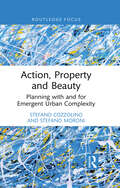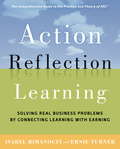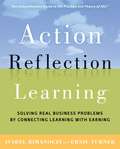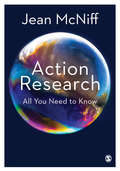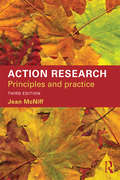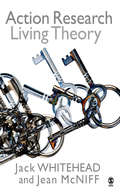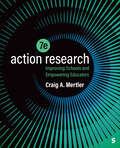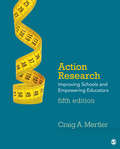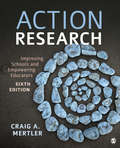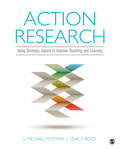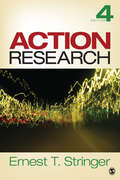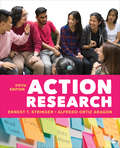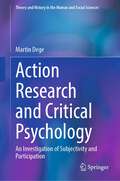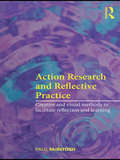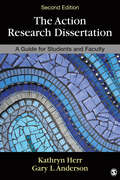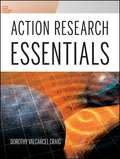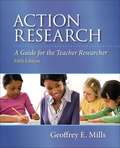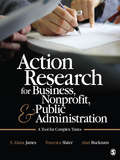- Table View
- List View
Action, Property and Beauty: Planning with and for Emergent Urban Complexity
by Stefano Moroni Stefano CozzolinoWhat are the challenges and potential of complex and emergent urban systems? This book answers this question by shedding new light on the topics of emergence, complexity, and self-organisation and showing their interconnectedness with other concepts, such as property and beauty, which are usually considered separately. It contributes to the discussion by interpreting and explaining the nature of emergent urban phenomena and suggesting more appropriate design and planning measures.The book explores and untangles these crucial topics in a compact and accessible way by offering fresh interdisciplinary perspectives on the themes of action and interaction, self-organisation, property, neighbourhood adaptability, urban beauty, and suitable public planning and design interventions. It provides novel and crucial insights for students, researchers, and academics in Urban Studies, Planning Theory, Planning Ethics, Planning Law, Legal, Political and Human Geography, Urban and Regional Economics, Urban Sociology, and Urban Design. It is essential for anyone interested in exploring the emergent dynamics of complex urban contexts, as well as for those involved in developing various projects and measures who aim to consider the spontaneous nature of cities seriously.
Action Reflection Learning: Solving Real Business Problems by Connecting Learning with Earning
by Isabel Rimanoczy Joseph TurnerLooking for the formula that makes training relevant and transferable — and achieves sustainable results? Look no further than Action Reflection Learning. It’s simple yet essential principles can make an unforgettable impact on your practice and revolutionize the way adult learners learn. Built on a solid foundation of adult learning theory and action learning methodology, this cutting-edge volume delivers a next-generation, multidisciplinary approach that will take your teaching and facilitating interventions to a new level of excellence.
Action Reflection Learning: Solving Real Business Problems by Connecting Learning with Earning
by Ernie Turner Isabel RimanoczyAction learning has quickly become a tool used by organizations for solving their critical and complex problems. In this revised edition of Optimizing the Power of Action Learning, award winning author Dr. Michael J. Marquardt explores innovative ways that action learning can be applied to the corporate landscape. New material includes: extensive enhancement of the role of the action learning coach; more strategies and steps in introducing, implementing, and sustaining action learning programs inside organizations; many new US and international case studies of action learning, and; additional theoretical elements of action learning. By exploring key principles and best practices that move action learning from good to great, Marquardt highlights resources for transforming people, groups, organizations, and even entire communities. Calling upon his pioneering experiences and the fundamentals introduced in his bestseller Action Learning in Action, Marquardt delivers the next generation of tools and techniques to make action learning successful in any organization. This comprehensive guidebook builds on the real experiences of thousands of managers in hundreds of companies, explores recent innovations in the field, and demonstrates how the power of action learning can help any organization thrive in today's fast-changing global marketplace.
Action Research: All You Need to Know
by Jean McNiffThis book gives you all you need to know about action research, why you need to know it and how it can help you become a self-reflective practitioner-researcher. It provides the ideas and frameworks to understand action research, combined with a practical workbook to guide you through the practicalities and complexities of doing action research in your own context. Inside you will find: An action plan to help you embark on your project Guidance and advice on learning to ask the right questions as you progress A full resource on writing up and communicating your results Inspiration to explain the significance of what you have achieved, so that other people can learn with and from you. Accessible and insightful, this is the complete start to finish guide to doing influential action research. It is the ideal companion for students and researcher-practitioners in any research setting, from education and health to business.
Action Research: All You Need to Know
by Jean McNiffThis book gives you all you need to know about action research, why you need to know it and how it can help you become a self-reflective practitioner-researcher. It provides the ideas and frameworks to understand action research, combined with a practical workbook to guide you through the practicalities and complexities of doing action research in your own context. Inside you will find: An action plan to help you embark on your project Guidance and advice on learning to ask the right questions as you progress A full resource on writing up and communicating your results Inspiration to explain the significance of what you have achieved, so that other people can learn with and from you. Accessible and insightful, this is the complete start to finish guide to doing influential action research. It is the ideal companion for students and researcher-practitioners in any research setting, from education and health to business.
Action Research: Principles and practice
by Jean McNiffSince its first publication, Action Research: Principles and Practice has become a key text in its field. This new updated edition clearly describes and explains the practices of action research and its underlying values, and introduces important new ideas, including: all professionals should be reflective practitioners; they should produce their personal theories of practice to show how they are holding themselves accountable for their educational influences in learning; the stories they produce become a new people’s history of action research, with potential for influencing new futures. This new edition has expanded in scope, to contribute to diverse fields including professional development across the sectors and the disciplines. It considers the current field, including its problems as well as its considerable hopes and prospects for new thinking and practices. Now fully updated, this book contains: A wealth of case-study material New chapters on the educational significance of action research An overview of methodological and ethical discussion The book is a valuable addition to the literature on research methods in education and nursing and healthcare, and professional education, and contributes to contemporary debates about the generation and dissemination of knowledge and its potential influence for wider social and environmental contexts. Practitioners across the professions who are planning action research in their own work settings will find this book a helpful introduction to the subject while those studying on higher degree courses will find it an indispensable resource.
Action Research: Living Theory
by Jean Mcniff Dr A Jack WhiteheadIn Action Research: Living Theory, Jean McNiff and Jack Whitehead set out their vision for action research in the 21st Century. This is a passionate, and compelling book, that defines the philosophy behind action research and the process of doing action research for all those interested in this fast growing area. It sets in place the foundations of action research as a discipline, and roots action research as a compassionate , ethical and politically-engaged form of enquiry. McNiff and Whitehead's book will be essential reading for all those with an interest in Action Research.
Action Research: Improving Schools and Empowering Educators
by Craig A. MertlerAction Research: Improving Schools and Empowering Educators, Seventh Edition serves as a comprehensive guide on action research for both beginning and experienced educators. Instead of focusing on theoretical aspects of research, the book provides detailed yet practical information guiding readers step-by-step through the iterative process of action research in a classroom or school-based context. The text adopts a highly sequential manner, beginning with topic conceptualization, reviewing related research, designing the study, executing the investigation, developing an action plan, and ultimately disseminating and reflecting on the results. A distinguishing feature of this book is the integration of numerous relatable examples, hands-on exercises, case studies, and explorations of published action research entries to ensure material comprehension. Each chapter of this Seventh Edition has been updated with a new Action Research Case Study, featuring the move to virtual instruction for the COVID-19 pandemic and beyond. Throughout, the author has added more on alternative strategies for disseminating research and expanded discussion of research topics, problems, questions, data, and analysis. Additionally, the entire book has also been updated for the Seventh Edition of the Publication Manual of the American Psychological Association to be current with the latest best practices in research. Included with this title: LMS Cartridge: Import this title’s instructor resources into your school′s learning management system (LMS) and save time. Don′t use an LMS? You can still access all of the same online resources for this title via the password-protected Instructor Resource Site. Select the Resources tab on this page to learn more.
Action Research: Improving Schools and Empowering Educators
by Craig A. MertlerAction Research: Improving Schools and Empowering Educators, Seventh Edition serves as a comprehensive guide on action research for both beginning and experienced educators. Instead of focusing on theoretical aspects of research, the book provides detailed yet practical information guiding readers step-by-step through the iterative process of action research in a classroom or school-based context. The text adopts a highly sequential manner, beginning with topic conceptualization, reviewing related research, designing the study, executing the investigation, developing an action plan, and ultimately disseminating and reflecting on the results. A distinguishing feature of this book is the integration of numerous relatable examples, hands-on exercises, case studies, and explorations of published action research entries to ensure material comprehension. Each chapter of this Seventh Edition has been updated with a new Action Research Case Study, featuring the move to virtual instruction for the COVID-19 pandemic and beyond. Throughout, the author has added more on alternative strategies for disseminating research and expanded discussion of research topics, problems, questions, data, and analysis. Additionally, the entire book has also been updated for the Seventh Edition of the Publication Manual of the American Psychological Association to be current with the latest best practices in research. Included with this title: LMS Cartridge: Import this title’s instructor resources into your school′s learning management system (LMS) and save time. Don′t use an LMS? You can still access all of the same online resources for this title via the password-protected Instructor Resource Site. Select the Resources tab on this page to learn more.
Action Research: Improving Schools and Empowering Educators
by Dr Craig A. MertlerCraig Mertler’s Action Research: Improving Schools and Empowering Educators introduces practicing educators to the process of conducting classroom-based action research. Practical and comprehensive, the book focuses on research methods and procedures that educators can use in their everyday practice. This Fifth Edition adds enhanced coverage of rigor and ethics in action research, means of establishing quality of both quantitative and qualitative data, as well as strengthened pedagogical features. New material includes discussions of social justice advocacy as an application of action research and the inclusion of abstracts in research reports.
Action Research: Improving Schools and Empowering Educators
by Dr Craig A. MertlerCraig Mertler’s Action Research: Improving Schools and Empowering Educators introduces practicing educators to the process of conducting classroom-based action research. Practical and comprehensive, the book focuses on research methods and procedures that educators can use in their everyday practice. This Fifth Edition adds enhanced coverage of rigor and ethics in action research, means of establishing quality of both quantitative and qualitative data, as well as strengthened pedagogical features. New material includes discussions of social justice advocacy as an application of action research and the inclusion of abstracts in research reports.
Action Research: Improving Schools and Empowering Educators
by Dr. Craig A. MertlerAction Research: Improving Schools and Empowering Educators introduces both novice and experienced practicing educators to the process of designing and conducting classroom-based action research in order to make their instructional practices more effective. This practical text focuses on the research methods and procedures that educators can use in their everyday instructional practices, classroom activities, and school procedures. Using over 20 years of teaching experience, author Craig A. Mertler provides insightful coverage of the knowledge and skills needed to design research studies, conduct research, and communicate findings to relevant stakeholders.
Action Research: Improving Schools and Empowering Educators
by Dr. Craig A. MertlerAction Research: Improving Schools and Empowering Educators introduces both novice and experienced practicing educators to the process of designing and conducting classroom-based action research in order to make their instructional practices more effective. This practical text focuses on the research methods and procedures that educators can use in their everyday instructional practices, classroom activities, and school procedures. Using over 20 years of teaching experience, author Craig A. Mertler provides insightful coverage of the knowledge and skills needed to design research studies, conduct research, and communicate findings to relevant stakeholders.
Action Research: Using Strategic Inquiry To Improve Teaching And Learning
by S. Michael Putman Tracy C. RockAction Research: Using Strategic Inquiry to Improve Teaching and Learning is a core text for the Action Research course in Education. The proposed text seeks to address the needs of practitioners as it will be primarily written for use within a graduate level action research class. It will be oriented towards proactive planning as part of an organized, efficient process for developing and conducting an action research study. The book will be organized around implementation of the action research process using self-regulatory principles, which is characterized by four phases: task definition, goal setting and planning, enacting, and adapting. These four phases will be addressed as the learner considers what action research encompasses and a topic to be studied, then proceeds to establish a plan and enact it. This overall process is organized as can be seen in the Table of Contents. Michael Putnam and Tracy Rock will highlight methods and processes that incorporate formative data that is readily available to teachers, facilitating associations between classroom instruction and the action research process. The text will also reinforce how action research can improve the teaching and learning process by reinforcing or changing perceptions about the use of informal data, including anecdotal notes or observations, in the research process.
Action Research: Using Strategic Inquiry to Improve Teaching and Learning
by S. Michael Putman Tracy C. RockAction Research: Using Strategic Inquiry to Improve Teaching and Learning helps educators use research to guide decision-making and determine the effectiveness of various instructional strategies. The book leads the reader through the action research process using a model of self-regulation, which focuses on task definition, goal setting and planning, enacting research, and adaption. Written specifically for educators who may not feel prepared to measure the impact of interventions on student learning outcomes, the book provides very practical and useful tools, containing specific examples that are relevant to teachers’ everyday reality. The text also reinforces how action research can improve the teaching and learning process by reinforcing or changing perceptions about the use of informal data, including anecdotal notes or observations, in the research process.
Action Research: Using Strategic Inquiry to Improve Teaching and Learning
by S. Michael Putman Tracy C. RockAction Research: Using Strategic Inquiry to Improve Teaching and Learning is a core text for the Action Research course in Education. The proposed text seeks to address the needs of practitioners as it will be primarily written for use within a graduate level action research class. It will be oriented towards proactive planning as part of an organized, efficient process for developing and conducting an action research study. The book will be organized around implementation of the action research process using self-regulatory principles, which is characterized by four phases: task definition, goal setting and planning, enacting, and adapting. These four phases will be addressed as the learner considers what action research encompasses and a topic to be studied, then proceeds to establish a plan and enact it. This overall process is organized as can be seen in the Table of Contents. Michael Putnam and Tracy Rock will highlight methods and processes that incorporate formative data that is readily available to teachers, facilitating associations between classroom instruction and the action research process. The text will also reinforce how action research can improve the teaching and learning process by reinforcing or changing perceptions about the use of informal data, including anecdotal notes or observations, in the research process.
Action Research: Enhancing Instruction In The K-12 Classroom
by Dr Ernest T. StringerThe Fourth Edition of Ernest T. Stringer’s best-selling Action Research offers easy-to-follow, clear guidelines that enable novice practitioner researchers to move comfortably through a process of inquiry and applied research. Featuring real-life examples and providing effective solutions that foster understanding of research procedures in real-life contexts, the book offers a simple but highly effective model for approaching action research: Look: building a picture and gathering information, Think: interpreting and explaining, and Act: resolving issues and problems. Using his own experience as a guide, Stringer encourages readers to grapple with the broader political and ethical challenges that frame each inquiry. The author’s engaging style makes the book especially relevant to those working with children, young adults, or people in community contexts, and is particularly relevant to those dealing with issues of diversity or with marginalized and disenfranchised groups. Clear, concise, and practical, Stringer’s accessible and engaging book is a must for students and professionals in educational, business, health, counseling, and social work settings.
Action Research
by Dr. Ernest T. Stringer Alfredo Ortiz AragónAction Research is an invaluable guide to novice researchers from a diversity of disciplines, backgrounds, and levels of study for understanding how action research works in real-life contexts. The Fifth Edition builds on the experiences of the authors by acknowledging the dramatic changes taking place in our everyday lives, including developments of social and digital media that have become central to modern life. Author Ernest T. Stringer and new co-author Alfredo Ortiz Aragón aim to provide a meaningful methodology arising from their extensive field experience for both students and practitioners. Presenting research that produces practical, effective, and sustainable outcomes to real-world problems, Action Research helps students see the value of their research in a broader context, beyond academia, to effecting change on a larger scale. Additional resources can be found at the authors&’ website http://research4action.com/
Action Research
by Dr. Ernest T. Stringer Alfredo Ortiz AragónAction Research is an invaluable guide to novice researchers from a diversity of disciplines, backgrounds, and levels of study for understanding how action research works in real-life contexts. The Fifth Edition builds on the experiences of the authors by acknowledging the dramatic changes taking place in our everyday lives, including developments of social and digital media that have become central to modern life. Author Ernest T. Stringer and new co-author Alfredo Ortiz Aragón aim to provide a meaningful methodology arising from their extensive field experience for both students and practitioners. Presenting research that produces practical, effective, and sustainable outcomes to real-world problems, Action Research helps students see the value of their research in a broader context, beyond academia, to effecting change on a larger scale. Additional resources can be found at the authors&’ website http://research4action.com/
Action Research and Critical Psychology: An Investigation of Subjectivity and Participation (Theory and History in the Human and Social Sciences)
by Martin DegeThis book examines the theoretical developments in the field of Action Research from a historical perspective. The central focus of the investigation is the concepts of democracy and subjectivity as defined by the field’s various traditions. To address this issue, this book offers a thorough investigation of the theoretical and historical underpinnings of Action Research in order to argue that such a clarification allows for a transcendence of the distinction between theory and practice in political action. This transcendence will be achieved with the theories of the German critical psychologist Klaus Holzkamp and his interpretation of subjectivity and democracy. Holzkamp establishes a comprehensive mode of change based on the contradiction of existing possibilities for action and restrictions in a concretely given empirical situation. This book is aimed at History of Psychology Classes, Social Workers, Activism Researchers, Undergraduate Courses in Critical Thinking and Political Action, and Decolonial Theory in Psychology.
Action Research and Reflective Practice: Creative and Visual Methods to Facilitate Reflection and Learning
by Paul McIntoshThe use of reflection as a tool to support and develop practice is becoming increasingly recognised across education, healthcare and the social sciences. Reflection is assumed to create depth of knowledge and meaning, both for self and those practised upon. Running alongside the use of reflection is the prevalent use of action research which some see as a way of approaching the study of human beings from a philosophical perspective, in which sharing takes place within mutually supportive environments. As a result, many academics and practitioners suggest that one cannot improve the methodology of action research without considering philosophical reflection. In Action Research and Reflective Practice, the author argues that reflective practice and action research can become mechanistic in their use unless fresh creative approaches are employed. Exploring the tension between the use of evidence-based practice, based upon solid ‘objective’ research, and reflection, with its ‘subjectivity’ and personal perception, this book argues that reflection is research. The author increases the use and effectiveness of both action research and reflection through the application of new creative and visual approaches. Action Research and Reflective Practice demonstrates that creative approaches can be utilised effectively in critically reflexive ways, creating a new style of action research that is both innovative and theoretically robust. The resultant approach will improve evidence-based research in education, healthcare and other social sciences to enhance perception and understanding of events, identity and self. This book will be highly beneficial to undergraduate and postgraduate students, as well as educational and social researchers, across a broad range of subjects within the social sciences.
The Action Research Dissertation: A Guide for Students and Faculty
by Dr Kathryn G. Herr Gary AndersonThe first edition of The Action Research Dissertation: A Guide for Students and Faculty was a first-of-its-kind reference, distilling the authors’ decades of action research experience into a handy guide for graduate students. The Second Edition continues to provide an accessible roadmap that honors the complexity of action research, while providing an overview of how action research is defined, its traditions and history, and the rationale for using it. Authors Kathryn Herr and Gary L. Anderson demonstrate that action research is not only appropriate for a dissertation, but also is a deeply rewarding experience for both the researcher and participants. This practical book demonstrates how action research dissertations are different from more traditional dissertations and prepares students and their committees for the unique dilemmas they may face, such as validity, positionality, design, write-up, ethics, and dissertation defense.
Action Research Essentials
by Dorothy Valcarcel CraigAction Research Essentials is a practical guide born of the author's own experience working with students in the social sciences and education, providing a step-by-step outline of how to "do" action research--backed by the most extensive theory and research coverage on the market today. The author guides future researcher/practitioners through the action research process via numerous concrete illustrations and a wealth of on-line resources; positioning it as a fundamental component of practice, A key and unique strength of the book is its outreach to a much larger breadth of students than usually found in action research books. This book will illustrate all the steps in action research using examples from education, social work, psychology, sociology, nursing, medicine, and counseling. The structure of the book is intended as the sole textbook for a course devoted to naturalistic inquiry, practitioner research, or beginning qualitative methods, or can complement a general research course.
Action Research (Fifth Edition)
by Geoffrey E. MillsThe book provides qualitative and quantitative guidelines for Action Research, to future educators via numerous concrete illustrations, study sites, videos and other supplemental materials.
Action Research for Business, Nonprofit, and Public Administration: A Tool for Complex Times
by E. Alana James Tracesea H. Slater Alan J. BucknamAction Research for Business, Nonprofit, and Public Administration covers the background, process, and tools needed to introduce and guide you through to a successful action research (AR) project. Included are how to successfully initiate, plan, and complete AR within all types of organizations while focused on business, nonprofit, and public administration. Graphic organizers and a modular sequence of topics help you manage the steps involved in AR practice. A protocol for weekly report writing, informed consent documentation, and clear guidelines for final analyses and report writing give graduate students the efficient format they need. This book teaches theory by interweaving discussion of the major content areas and stories of student success with the concepts that impact practice.
